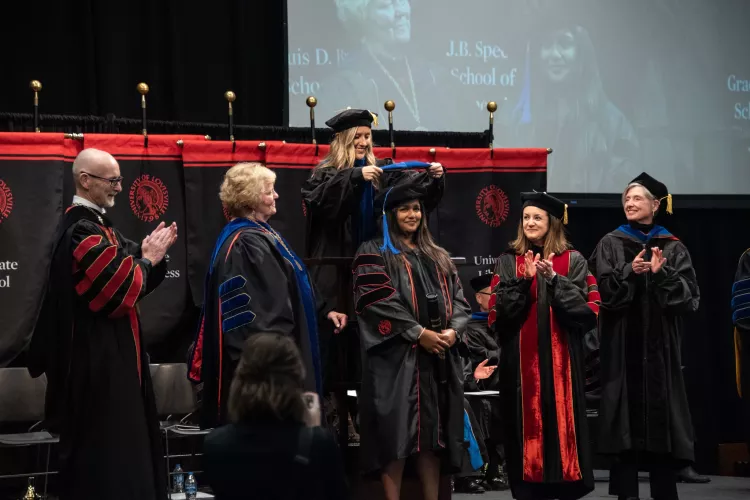UofL School of Nursing unveils new mural honoring healthcare heroes
October 2, 2024There are a number nurses who have made a lasting impact in history, and the UofL School of Nursing wanted to honor a few of them with a mural on the first floor of its building on the HSC campus. The mural was created by local artist Damon Thompson, who is known for murals across Louisville in mediums from spray paint to acrylic.
"I'm very excited to be working on this project. This mural showcases six nurses both men and women, from across the world and from different cultures and faiths. Nurses are people who give all of themselves to the care and well-being of people they usually don't even know," Thompson said. "I have two sisters and one brother who are nurses: I've seen this selfless compassion carry over towards all their friends and family. These six individuals show that no matter where you're from or what your faith is, your decision to be a professional care giver is the right one. This mural is a way to tell the next generation that healers matter, that being a nurse is worth it."
The mural includes from left to right: Hector Hugo Gonzalez (1937- ), Mary Jane Seacole (1805-1881), Mary Mahoney (1845-1926), Rufaida Al-Aslamia (570-630 CE), Susie Walking Bear Yellowtail (1903-1981) and Joe Hogan(1953-).
Hector Hugo Gonzalez: Texas-born in 1937, Gonzalez, received his nursing diploma from Robert B. Green Memorial Hospital School of Nursing in 1962 and a bachelor's degree in 1963 from Incarnate Word College. Gonzalez served in the U.S. Army Nurse Corps during the Vietnam War. In 1974, Gonzalez completed a PhD, with focus on education, from the University of Texas at Austin and became the first Mexican-American Registered Nurse to earn a doctorate in the United States. He had a lengthy career in nursing education and was a nursing educator consultant in Mexico, Puerto Rico and Kuwait.
Mary Jane Seacole: A Jamaican-born nurse, also known as "The Creole with the Tea Mug" became famous for her contribution during the Crimean war. After her rejection to gain a nursing position in the Crimean War (which she questioned whether racism was a factor), Seacole set up a British Hotel to provide food and supplies to soldiers. She assisted the wounded at the military hospitals. After the war, she returned to England. She published a book titled, "Wonderful Adventures of Mrs. Seacole in May Lands," which was the first autobiography written by a Black woman in Britain.
Mary Mahoney: Mahoney is recognized as the first Black registered nurse. She was known for her efficiency, patience, and caring bedside manner. In 1908, she co-founded the National Association of Colored Graduate Nurses to advocate for the equality of African American nurses. That group founded the Mary Mahoney Award, which is still awarded today by the American Nurses Association. Mahoney has been credited as one of the first women to register to vote in Boston following the ratification of the 19th Amendment, granting women's suffrage on Aug. 26, 1920.
Rufaida Al-Aslamia: Born in the year 620, which is approximately 1,400 years before Florence Nightingale, was the first female Muslim nurse. She served during the holy wars with Prophet Muhammad on arrival to Medina. She implemented her clinical skills into developing the first ever documented mobile care units that were able to meet the medical needs of the community. Her work was primarily in hygiene and stabilizing patients prior to more invasive procedures.
Susie Walking Bear Yellowtail: The first Crow and one of the first Native Americans to graduate as a registered nurse in the United States has received many honors for her work. Most notably received were the President's Award for Outstanding Nursing Health Care in 1962 and honored as the Grandmother of American Indian Nurses in 1978 by the American Indiana Nurses Association. Yellowtail used her talents to better the Indian Health Service (IHS) by speaking out on the inadequate facilities, the language barrier that interceded between healthcare workers and the IHS consumers, as well as highlighting the poor living conditions that plagued the health of many Native American families.
Joe Hogan: In 1979, an African American nurse in Columbus, Mississippi, Hogan, applied to Mississippi University for Women to further his education and get a baccalaureate degree. But he was denied due to his gender. Hogan petitioned the university to change their guidelines and filed a lawsuit with the U.S. District Court on violation of his 14th Amendment rights. The court ruled against him stating MUW had appropriate guidelines for a female-only curriculum. The case went to the Supreme Court who ruled the policy was unconstitutional and Hogan could enroll in 1982.
Check out a time lapse video of the mural's creation:
Story written by Adrianne Kelly, School of Nursing marketing specialist and events coordinator.



